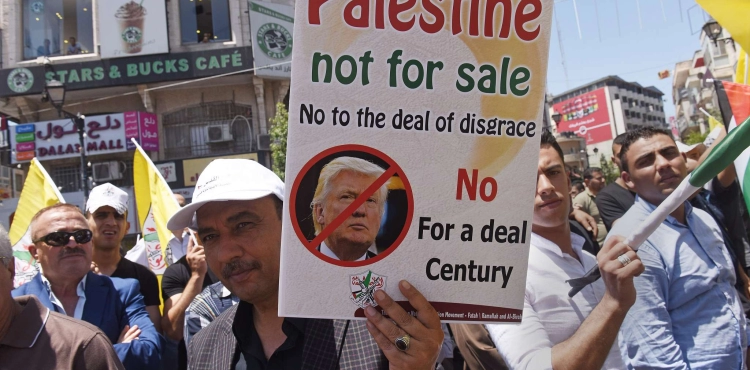The economic conference in Manama, which precedes the declaration of the political side of the US plan for peace in the Middle East, failed to offer anything to convince the Palestinians who boycotted it and denounced it.
All Palestinian factions united to condemn the economic conference in Bahrain before it was held. The event did not receive much Palestinian media coverage.
Despite the protests in the West Bank and Gaza Strip were not expected, many Palestinians ignored the event held Tuesday and Wednesday in the Bahraini capital.
The view of the Palestinian street was in line with the view of the leadership, which did not take the US initiative to resolve the conflict seriously.
"A Palestinian was not interested in the conference," said university professor Rawhi Ziadeh in the West Bank city of Ramallah.
"If my wife decides to cook for me according to what I do not like, I will not be able to eat it whatever you add to it, and we do not want this conference," he added.
The Palestinian Authority in the West Bank has frozen contacts with the US administration since late 2017 after the US president recognized Jerusalem as the capital of Israel, considering that Washington was blatantly biased toward Israel.
All prominent Palestinian businessmen refused to attend the conference, accusing the United States of trying to use its financial influence to buy their aspirations for an independent Palestinian state.
The Palestinians boycotted the Bahrain conference to limit its discussions on the potential economic benefits of the peace initiative without going into the political arena.
At the end of the conference, US President George W. Bush´s adviser, Jared Kouchner, said he had "left the door open" if Palestinians were interested in peace.
"If they really want to make people´s lives better, then we have developed a wonderful framework through which they can participate and try to achieve that."
The United States has announced that its Middle East peace plan aims to attract more than $ 50 billion in investments for Palestinians, create a million jobs for them and double their gross domestic product within 10 years.
The economic plan discussed in Manama drew a "rosy" future for the Palestinian territories in terms of infrastructure and fifth-generation mobile technology.
In fact, the Gaza Strip is still under Israeli siege and its population is barely using second-generation technology.
The participants at the conference repeatedly spoke of corruption in the Palestinian territories and considered it a cause of the economic crisis, and the occupation was barely mentioned as a reason.
In Bahrain, too, there has been no talk of Hamas, which controls the Gaza Strip and has fought three wars with Israel.
The Palestinian government faces a severe financial crisis, forcing it to pay its 130,000 employees half of their salaries.
Despite this crisis, Palestinian officials do not count on the success of the US initiative to settle the conflict.
"The Bahrain workshop failed to achieve its objectives," said Ahmed Majdalani, a member of the executive committee of the PLO.
"It was very poor and the content was empty," he said.
Polls show that President Mahmoud Abbas is unpopular.
"The US administration was taking to take advantage of the potential economic returns of its plan to improve the relationship between the Palestinian people and their leadership," said Ofer Zalesberg, an analyst at the International Crisis Group. "But things did not go that way, but the opposite happened.
"They have played down the importance of media coverage in the Palestinian media ... This step has increased Palestinian rejection of American efforts," he said.
Palestinian youth Mohammed Ghalis, 28, who distributes water to offices in Ramallah, said the Palestinians paid little attention to the conference but considered it "unimportant".
"The economic solution is not a substitution for a political solution, we want a fair political solution to our cause," he said.












